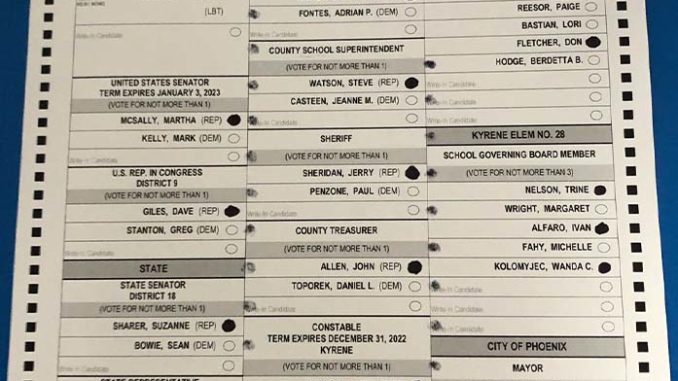
The Arizona Court of Appeals has announced it will hear arguments later this month in a lawsuit by two Maricopa County voters who contend county elections officials did not comply with the letter or the spirit of the law on Election Day.
Laura Aguilera and Donovan Drobina experienced problems while attempting to vote in-person at separate voting centers on Nov. 3. Both testified they left not knowing if their ballots were counted, and as a result, they wanted to observe the adjudication process utilized by Maricopa County.
Electronic adjudication involves poll workers reviewing digitalized images of damaged or defective ballots in an attempt to determine a voter’s intent. Aguilera and Drobina contend state law requires electronic adjudication to be performed in a location open to public viewing.
Last December they sued then-Maricopa County Recorder Adrian Fontes, the county’s five-member board of supervisors, and the county itself. The Arizona Democratic Party was granted status to intervene in the case and is thus recognized in the appeal as well.
An appellate court order setting May 26 for oral arguments is in addition to an order for supplemental briefing from attorneys on several legal issues. And that, says the attorney for Aguilera and Drobina, is good news.
“The fact that the Court of Appeals ordered supplemental briefing means that they are taking the case seriously and we have a serious shot at winning,” attorney Alex Kolodin told Arizona Daily Independent.
The additional briefing involves a general legal question, but also the observation of ballot counting as addressed in Arizona’s Election Procedures Manual (EPM). The judges also wanted briefing on Arizona Revised Statute 16-621(A) which reads in part that all proceedings at the counting center shall be conducted “under the observation of representatives of each political party and the public.”
Maricopa County interprets the statute and the EPM as not requiring in-person public observation of the adjudication process. The judge who decided the Aguilera and Drobina case last year ruled county officials could satisfy any public observation requirement by providing remote viewing, otherwise known as livestreaming, instead of permitting the public into the elections facility.
On appeal, Kolodin argues the lower court judge got both parts of the decision wrong. First, he contends livestreaming is not an adequate alternative for in-person observation. And second, even if watching remotely via a video feed was acceptable, Maricopa County’s own director of election day operations testified the cameras installed in the election facility do not capture the adjudication process.
It is also the position of Maricopa County that neither Aguilera nor Drobina have standing to challenge how the adjudication process is conducted. They also argue the matter is moot because the case was decided after all ballots were counted.
Kolodin counters that the Aguilera and Drobina case is not moot, as his clients are seeking prospective relief in how Maricopa County handles adjudication in future elections.
Aguilera testified at trial that she checked-in on Election Day at one of Maricopa County’s 175 voting centers and was given a ballot. She said the tabulation machine provided no confirmation that her ballot was accepted and even after reporting the problem to a poll worker Aguilera left not knowing the status of her ballot.
A later check of the county’s voter information webpage did not show Aguilera as checked-in to vote, supporting her belief that an election official voided her ballot but then could not get her another one. County officials later suggested her ballot was handled through the adjudication process.
Drobina, the other plaintiff, alleges a tabulation machine at a different voting center was unable to read his ballot despite two attempts. He testified a poll worker instructed Drobina to put his ballot in a special slot on the tabulation machine so it could be manually reviewed later.
This caused Drobina to leave without his ballot already being tabulated at the voting site, as ballots requiring adjudication are taken to the central elections facility. There they are run through a different tabulation machine, but if the ballot still can’t be read it is segregated for adjudication by elections officials.
Drobina contended that “voters have a right to know with certainty that, when they follow the instructions of elections officials, their votes will be counted both automatically and perfectly.”
As of press time the Arizona Democratic Party had not filed a supplemental brief with the court of appeals.
